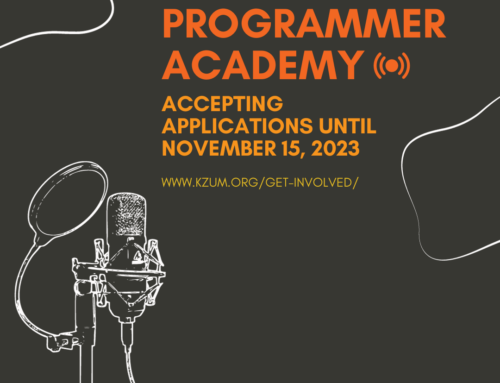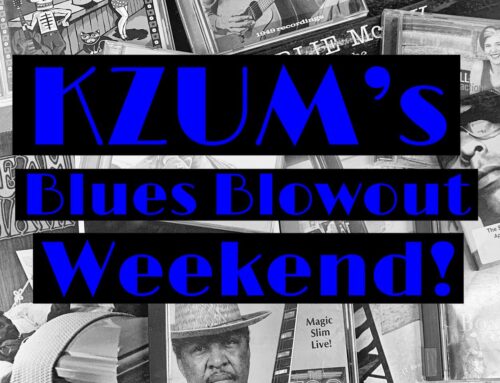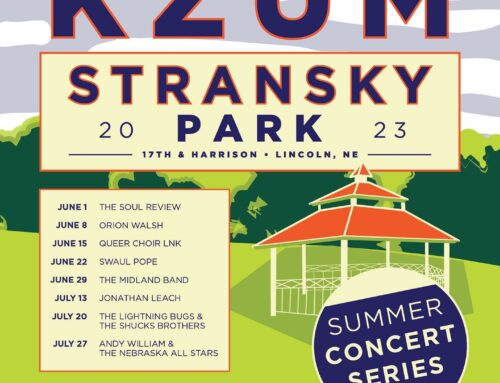By Casey Welsch
April 6, 2018
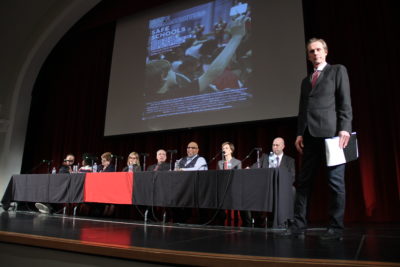
Moderator Joe Starita (standing) and the panelists at the Safe Schools Build Safer Communities town hall at Lincoln High School on April 5, 2018 . Casey Welsch/KZUM.
Hundreds of people packed Lincoln High School’s Ted Sorensen Auditorium for “Safe Schools Build Safer Communities” — a town hall discussion of community and school safety Thursday evening. Parents, students, activists and officials took turns voicing their concerns in a sometimes tense exchange of perspectives before a panel of local lawmakers and community leaders. The event was broadcast live on KZUM.
The meeting was organized in response to the increased fear many parents and students feel about going to school in the wake of multiple mass shootings in U.S. schools. Panelists at the town hall were Lincoln Police Chief Jeff Bliemeister, Lincoln City Councilwoman Leirion Gaylor Baird, Lincoln Public Schools Superintendent Steve Joel, attorney and Parents United for Greater School Safety President Korey Reiman, Pastor John Harris of First Baptist Church, Child Guidance Center Executive Director Katie McLeese Stephenson, LPS Board Member Connie Duncan and Lincoln High School senior Maia Ramsey. The event was moderated by University of Nebraska-Lincoln Professor Joe Starita.
“This event is really for students,” said Starita to open the discussion. Several high school students were present in the crowd. “We want the audience to engage the panelists and vice versa.”
Engage they did. After each of the panelists introduced themselves and offered their perspectives on the issue of community safety, the evening was turned over to the audience, who offered a diverse array of views.
Shaun Nichols, a soldier, spoke first about the necessity of preparing to confront evil, a reality he sees no way to prevent.
“The only real way to keep society safe is to implement security,” he told the panel. “You have to have someone ready at all times to act.
“Evil cannot be stopped. Some people are born evil. There can be no treatment. It’s a nice idea, but it’s not real.”
Nichols’ view was held by several people at the town hall. A possible solution to the threat of gun violence in schools that came up over and over again from both the crowd and some panelists was the idea of hiring more school resource officers (SROs) to act as potentially armed guards in Lincoln schools.
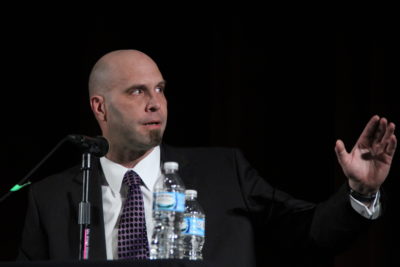
Korey Reiman discusses the need for swift action to ensure students’ safety in schools. Casey Welsch/KZUM.
“There’s going to be evil people tomorrow, and a year from now,” said panelist Reiman. “How do we deal with this? There’s great arguments I’ve seen on Facebook, but they don’t make my son safe.”
Reiman’s group Parents United was well represented at the town hall, with several speakers voicing their impatience with the traditional lawmaking process, and their lack of faith in state and national lawmakers.
“Is this congress going to pass substantial gun laws?” Reiman asked. “You know they’re not, if you’re being honest with yourself.
“You can vote if you want, but I can’t wait for that. That’s not going to make my son safe. He’s in school right now.”
Reiman’s desperation was shared by many parents in the audience. A mother of two LPS students broke down the number of hours required by students to complete high school, approximately 18,304 per student, and pleaded with panelists to make her remaining hours as a public school parent less terrifying.
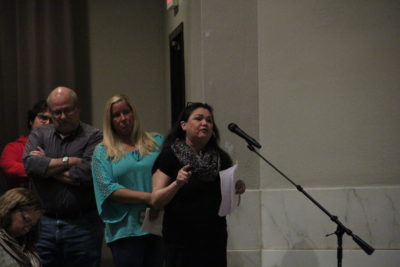
A mother of two LPS students pleads with the panelists to act quickly and decisively to make her children safer at school. Casey Welsch/KZUM.
“I have 1,300 hours left to go,” she said. “Please help me to not hold my breath when I drop my kids off. I don’t want my kids to be on the front lines anymore.”
Superintendent Joel stressed throughout the evening that LPS was doing everything in its power to ensure the safety of its students.
“We know this is a hot button topic,” he said. “We know this is a concern. We don’t take that lightly. Our highest priority is the safety and security of your children.”
Joel highlighted the investments LPS has already made in security and threat assessment personnel. LPS schools employ national threat assessment officers, secured entrances, secure doors, video cameras, hall walkers and perimeter patrols.
“It’s about threat assessment and threat management,” he said. “We have eyes on students we’ve identified as struggling.”
LPS Board Member Duncan stressed that the school board is also doing everything it can to ensure the safety of students.
“Safety is all we’ve been working on all week,” she said. “It’s all we’ll continue to work on until we can keep our students safe.”
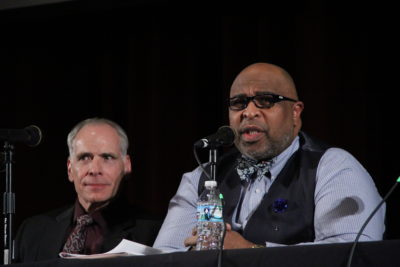
Pastor John Harris calls for a return to community values and involvement as Superintendent Steve Joel looks on. Casey Welsch/KZUM.
Pastor Harris, who all evening stressed a need to cultivate greater community and personal involvement among neighborhoods, called for action.
“Time is ticking,” he said in response. “Time is of the essence. Why don’t we get busy? There is no more time for foolishness. It’s time to make a difference.”
Some city and school officials think they have a way to address these concerns by way of a Joint Public Agency (JPA), a tax-funded body composed of Lincoln and LPS officials that would raise money for SROs and other measures to make Lincoln schools safer.
“A JPA is going to hold people accountable,” Chief Bliemeister said. “It’s going to take a consensus to act. We need to hold ourselves accountable.”
Councilwoman Gaylor-Baird acknowledged that the issue of community safety will take some time and money to work out.
“It’s going to take all of us,” she said. “It’s going to require an investment not just of money, but of time. We must be sensitive of the costs, but a JPA creates a dedicated funding source for the resources this community is demanding.”
Jane Kinsey, a spokeswoman for Watchdogs of Lincoln government, wasn’t convinced of the need for the JPA, claiming the proposed group was a power grab by the mayor’s office to raise taxes.
“The big issue is not that we’re going to do something,” she said. “The bigger issue is how are we going to pay for it?”
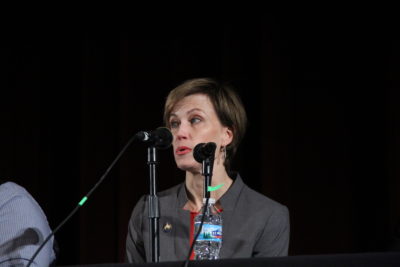
Councilwoman Leirion Gaylor Baird stresses the need for collaboration on community safety. Casey Welsch/KZUM.
Gaylor-Baird responded, “An isolated revenue stream doesn’t just mean more government, it means more transparency. Why not invest in the future success of our children?”
Pastor Harris chimed in with a cost-free approach to making communities safer.
“Money doesn’t have anything to do with it. Relationships do,” he said. “Better community involvement doesn’t cost anything.”
Harris placed the blame for mass shootings and school violence squarely on the shoulders of society, saying “it’s our fault. We go into our silos and shut people out and wonder why our kids turn out the way they do.”
This idea prompted something of a heated exchange between Harris and Reiman, the latter of whom responded “I can’t parent other people’s kids. I can’t go into a kid’s home and tell them what to do. It’s a good sound bite, but how do I make parents parent better?”
A repeated theme at the town hall was the role mental health plays in making schools and communities safer. Child Guidance Center Director Stephenson had to remind the crowd and the panelists that “mental health” cannot be applied as a catch-all cause for gun violence.
“Mental health in terms of school safety is complex,” she said. “Not all people who commit violence in schools are mentally ill. The vast majority of mentally ill people aren’t violent.”
This clarification drew some applause from the crowd.
“It’s easy to conflate the two,” she said, referring to violent behavior and mental illness. “We all have disappointments in life, but it’s how we deal with them that matters.”
Stephenson cited a statistic that one in five students will have a serious mental health issue, and that schools need to provide them with better access to higher quality services.
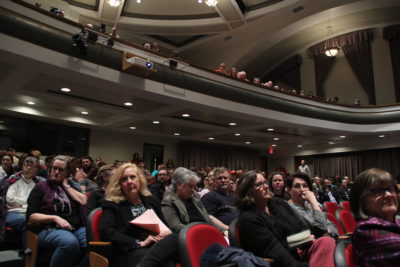
Hundreds of people packed the Ted Sorensen Auditorium at Lincoln High School for the town hall discussion. Casey Welsch/KZUM.
Some in attendance were unhappy that a true anti-gun voice was missing from the panel and the discussion. Amanda Gailey, president of Nebraskans Against Gun Violence, said Friday that the group was disappointed that “there didn’t seem to be anyone involved who specialized in gun policy.
“We were kind of surprised that LPS and the city announced a JPA to levy a tax without consulting constituent groups,” she said.
NAGV opposes the proposal for armed SROs in schools, and worries about public money being used to pay for them.
“Schools with beefed up SRO presence have increased criminalization of students, especially minority and disabled students,” Gailey said. Her group seeks more immediate action, advocating at the city level for child access prevention laws, which she says will help cut down on access to firearms by juveniles.
The evening was not entirely without discussion of guns themselves. In one of the more impassioned testimonies of the evening, Paul Burd, a self-described “white, male, autistic shut-in who loves his violent video games,” tried to wrest the discussion back from focusing on funding and mental illness to where he thought it had strayed from.
“We have a problem with guns,” he said, bluntly. “Only two to three percent of violent crimes are committed by mentally ill people. Guns are what we need to be talking about.”
Visibly shaking but speaking eloquently, Burd asked the panelists to broaden the scope of what community and student safety means.
“What happens when our children leave the school building?” he asked, wondering if anything was being planned to keep people safe in society at large. “Our students are important when they are in school, but what about outside of it or after they aren’t students anymore? There’s no reason for semiautomatic weapons. Nobody fucking needs a semiautomatic weapon.”
Burd drew huge applause from the crowd with that kicker.
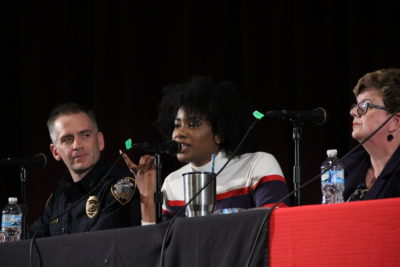
LHS senior Maia Ramsey talks about the wants of students, flanked by LPD Chief Jeff Bliemeister and Child Guidance Center Executive Director Katie McLeese Stephenson. Casey Welsch/KZUM.
Still, the star of the night seemed to be panelist and LHS senior Maia Ramsey, who spoke clearly and authoritatively about the perspective of LPS students she had spoken with in the days leading up to the town hall.
“We all want gun reform,” she said to applause. “But we don’t know what it looks like. It isn’t a black and white issue. It works differently in different situations. But we’re all passionate about our safety. That brings us together.
“Students are fed up with feeling unsafe in our schools. They’re fed up with talking about it all the time and never doing anything.”
Ramsey, a black woman, said it’s difficult trying to represent the perspectives of all students while also dealing with racial issues and resistance from society due to her and her peers’ age.
“I feel like it doesn’t make any sense,” she said. “(Some members of the public) are invalidating us while also expecting us to do something about it.
“Young people are fed up, and we’re not afraid to have these conversations.”
According to Starita, the moderator, after the event, this town hall was just the beginning of what are sure to be many such conversations. Already, students are discussing hosting an all-youth town hall on gun violence in schools, and more planning and listening events are in the works.
Superintendent Joel still believes in continuing the work LPS is already doing to ensure student safety, but acknowledges that more work needs to be done.
“We have to get to be a safe place,” he said. “You can’t be successful if you aren’t safe.”
Listen to the full town hall from Thursday, as broadcast on KZUM. Audio courtesy of Lincoln Public Schools:
Casey Welsch is a KZUM contributor.


